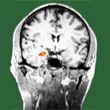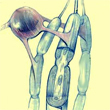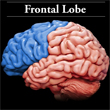Monday, 3 March 2014
The Various Speeds at Which We Perceive Time

Our perception of how fast time passes is amazingly subjective. When we are children, our summer vacations from school seem to stretch on forever. When we are grownups, we are often surprised to realize how long it has been since some major event occurred—Hurricane Katrina was over eight years ago, and the nuclear disaster at Chernobyl almost 28 years ago!
Thus we frequently underestimate or overestimate elapsed time. But what are the factors that push our estimates in one direction or the other? Are there some time scales that are affected and others that are not? Are there certain areas of the brain that are associated with the way we estimate time? (more…)
From Thought to Language | Comments Closed
Tuesday, 18 February 2014
Lasting Effects of Meditation
 A brain-imaging study published in the November 2012 issue of the journal Frontiers in Human Neuroscience seems to confirm past brain-imaging studies which found that meditation can help people pay better attention and manage stress more effectively. But the November 2012 study goes a bit further: it also shows that such measurable positive effects of meditation seem to continue even when the individual in question is not meditating. (more…)
A brain-imaging study published in the November 2012 issue of the journal Frontiers in Human Neuroscience seems to confirm past brain-imaging studies which found that meditation can help people pay better attention and manage stress more effectively. But the November 2012 study goes a bit further: it also shows that such measurable positive effects of meditation seem to continue even when the individual in question is not meditating. (more…)
The Emergence of Consciousness | Comments Closed
Monday, 3 February 2014
Glial Cells Too Are Sensitive to the Environment
 For a long time, the brain’s glial cells were assumed to be mere “filler” between the neurons. For a while after that, the glial cells were assumed to serve primarily nutritive functions. But now, year after year, research findings are showing glial cells to be more and more complex. For example, recent studies have shown their role in brain plasticity and how social isolation can disrupt it.
For a long time, the brain’s glial cells were assumed to be mere “filler” between the neurons. For a while after that, the glial cells were assumed to serve primarily nutritive functions. But now, year after year, research findings are showing glial cells to be more and more complex. For example, recent studies have shown their role in brain plasticity and how social isolation can disrupt it.
More and more studies indicate that people who experience severe neglect and social isolation as children display cognitive and social impairments as adults. To examine this phenomenon, two research teams recreated these unfavourable conditions for baby mice by placing them in isolation for several weeks. (more…)
From the Simple to the Complex | Comments Closed
Tuesday, 7 January 2014
Human Frontal Cortex Differs Even Genetically

The basic goal of many neuroscientific studies is to determine what makes human brains so different from those of other animal species, and in particular those of our cousins, the great apes. One such study was conducted recently by geneticist Genevieve Konopka and her team, and it yielded some very interesting findings about the frontal lobe of the brain.
One difference that scientists already knew about was that the frontal lobe accounts for a greater proportion of the total surface area of the cortex in humans than in other species (29%, compared with 17% in rhesus monkeys, 7% in dogs, and 3.5% in cats). But Konopka and her team studied differences in the expression of the genes for the various neurons that compose the frontal cortex. Specifically, the team compared the genes that are expressed (and therefore, active) in the frontal cortex of humans with those expressed in the frontal cortex of chimpanzees and macaques. The geneticists found that many of these genes are expressed differently in humans compared with these two other primate species. (more…)
Evolution and the Brain | Comments Closed
Tuesday, 24 December 2013
Junk Food and Alzheimer’s: Closer Links Than Once Believed
 For most parents, packing their kids’ school lunches in the morning may seem like just a routine task, but it turns out to be a really important one. Not only can it influence children’s future eating habits, but it may also have a major impact on their quality of life when they are old enough to be grandparents themselves.
For most parents, packing their kids’ school lunches in the morning may seem like just a routine task, but it turns out to be a really important one. Not only can it influence children’s future eating habits, but it may also have a major impact on their quality of life when they are old enough to be grandparents themselves.
Or at least that’s what many recent studies on Alzheimerb s-type dementia seem to suggest. What’s the connection? Children may be more likely to develop obesity and diabetes—established risk factors for Alzheimer’s—if their parents fill their lunch bags with junk food because it’s easier than arguing with them about the virtues of eating a balanced diet! (more…)








